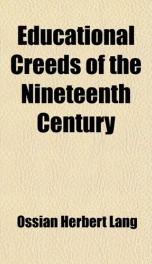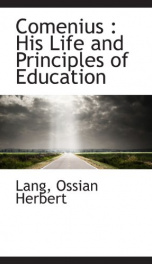educational creeds of the nineteenth century

Purchase of this book includes free trial access to www.million-books.com where you can read more than a million books for free. This is an OCR edition with typos. Excerpt from book: II. THE PEDAGOGICAL CREED of Johk S. Clark. The substance of my pedagogical creed is contained in the following comments on the creed of Professor John Dewey, of the University of Chicago : The pedagogical creed of Professor Dewey, as published in The School Journal of January 16, 1897, is a notable contribution to educational literature. Since Spencer's famous essay, over thirty years ago, there have been few statements of the basis, function, and purposes of education that are so sound, so sensible, and so suggestive as this word from Chicago University. Educational thinkers and workers owe Professor Dewey a genuine debt for his comprehensive setting forth of the problem as he sees it. We have here one of the first satisfactory statements of the interrelation between the psychological and the social aspects of education. Investigation into children's individual capacities, interests, and habits is to be pursued, we are told, not wholly out of deference to the innate self, but, above all, for the sake of discovering the most feasible ways of helping the individual to receive and to give his share of the life of the race. "All education," says Professor Dewey, "proceeds by the participation of the individual in the social consciousness of the race." Tltree Principles.I take it that the professor's main points of emphasis are three : 1. The individuality of the child : his personal capacities, interests, and powers. 2. The social environment of the child as a world of conscious intelligence ; the gradual understanding of this social world by the individual through coming into conscious touch with its best aspects. John S. Clark. 3. The creative activities of the child as the point of concentration in his educational development; the creative activities as ...
Info about the book
Author:
Series:
Unknown
ISBN:
1440075050
Rating:
2.5/5 (1)Your rating:
0/5
Languge:
English
Users who have this book
Users who want this book
What readers are saying
What do you think? Write your own comment on this book!
write a commentGenre
if you like educational creeds of the nineteenth century try:
Other books by this author
Do you want to read a book that interests you? It’s EASY!
Create an account and send a request for reading to other users on the Webpage of the book!



